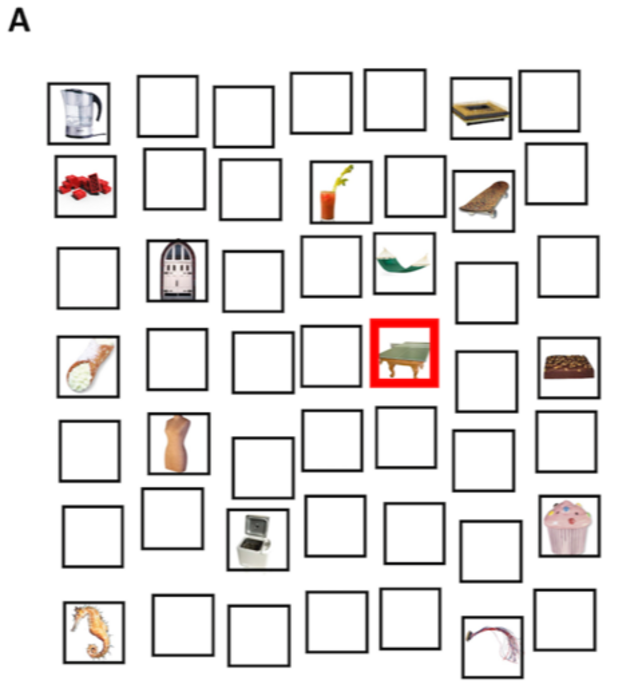The next time you’re struggling to remember exactly where you left your keys, parked your car or put down your glasses, don’t necessarily give up on your memory completely. Previous research has shown that, if people are shown a large number of objects, they are very good at subsequently remembering which objects they have seen. A new study suggests that people are also surprisingly good at knowing where and when they saw those objects. When shown objects on a 7-by-7 grid, many observers could recall the location of over 100 items, choosing the right location or a cell right next to the correct one. A series of three experiments conducted by investigators from Brigham and Women’s Hospital, a founding member of the Mass General Brigham healthcare system, illustrate that people have a “spatial massive memory” (SMM) for where objects are located and a “temporal massive memory” (TMM) for when objects were last seen. Their results are published in Current Biology.

Credit: Brigham and Women’s Hospital
The next time you’re struggling to remember exactly where you left your keys, parked your car or put down your glasses, don’t necessarily give up on your memory completely. Previous research has shown that, if people are shown a large number of objects, they are very good at subsequently remembering which objects they have seen. A new study suggests that people are also surprisingly good at knowing where and when they saw those objects. When shown objects on a 7-by-7 grid, many observers could recall the location of over 100 items, choosing the right location or a cell right next to the correct one. A series of three experiments conducted by investigators from Brigham and Women’s Hospital, a founding member of the Mass General Brigham healthcare system, illustrate that people have a “spatial massive memory” (SMM) for where objects are located and a “temporal massive memory” (TMM) for when objects were last seen. Their results are published in Current Biology.
“People often think that their memory is terrible, but our results show that we can recall where and when an object appeared with good, if not perfect, precision for a large number of objects,” said corresponding author Jeremy Wolfe, PhD, of the Brigham’s Department of Surgery. “While our spatial and temporal memory for objects may not be as impressive as some birds or squirrels, who have to remember where they hid their food for the winter, our data show that we do have massive memory for objects.”
To conduct their study, Wolfe and colleagues asked participants to remember a number of objects placed on a 7-by-7 grid. Each item was highlighted for two seconds by placing a red square around it. After participants were shown the items, all of the images were removed and the participants were then tested on their ability to recall if they had seen an item before and, if so, where it had been located on the grid.
“In some ways, this is a bit like the game of Memory that many of us played as children, where we turned over a card and then tried to recall the location of a matching card that we had seen before,” said Wolfe. “But unlike in the children’s game, we didn’t just count the exact ‘correct’ answer. We measured how close the participant got to the previously seen image.”
Altogether observers saw 300 different objects. Many observers could localize over 100 items to within +/- one cell of the true object location. In a subsequent experiment, participants were shown items one at a time and were asked to click on a timeline, present on the screen, to indicate when they had seen the object. The researchers reported that participants localized 60-80% of old items to within +/-10% of their correct time, markedly better than the 40% that they could have gotten by guessing.
The authors note that further experiments would be needed to define the upper limits of massive memory or to investigate other topics such as possible gender effects on memory.
Wolfe explains that some things slide into our long-term memory far more easily than others—understanding what we can remember most easily, such as pictures of objects and scenes, could help us make the most of our memory.
“Since ancient times, people have been using memory tricks related to our ability to remember pictures and scenes to help encode large amounts of information to store in their minds. In that sense, it’s not terribly surprising that, using our methods, we discover that we’re pretty good at remembering where objects are,” said Wolfe. “Our experiments show that spatial and temporal massive memories exist. Future research will define their limits.”
Disclosures: None.
Funding: This work was supported by the National Science Foundation (grant 1848783) and the Harvard Mind Brain and Behavior program.
Paper cited: Wolfe JM et al. “Spatial and Temporal Massive Memory in Humans” Current Biology DOI /10.1016/j.cub.2022.12.040
Journal
Current Biology
DOI
10.1016/j.cub.2022.12.040
Method of Research
Observational study
Subject of Research
People
Article Title
Spatial and temporal massive memory in humans
Article Publication Date
23-Jan-2023




